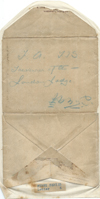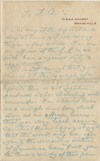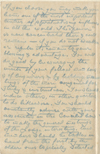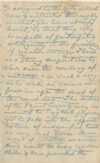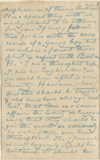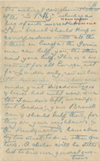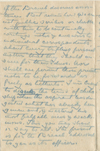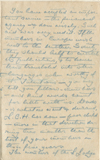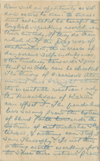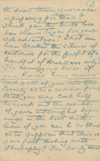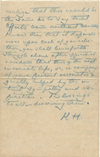Mahatma Letter to F. Arundale - LMW 1 No. 4
| Quick Facts | |
|---|---|
| People involved | |
| Written by: | Koot Hoomi |
| Received by: | Francesca Arundale |
| Sent via: | unknown |
| Dates | |
| Written on: | unknown |
| Received on: | early September 1884 |
| Other dates: | unknown |
| Places | |
| Sent from: | unknown |
| Received at: | Elberfeld |
| Via: | unknown |
This letter is Letter No. 4 in Letters from the Masters of the Wisdom, First Series. Mahatma Koot Hoomi provides guidance to Francesca Arundale concerning the London Lodge.[1]
< Prev letter in LMW 1
Next letter in LMW 1 >
Envelope
|
F.A. FTS
|
NOTES: |
Page 1 transcription, image, and notes
|
Letterhead: 77. Crescent Circle, Text: To F. A. [symbol] The day of the separation is close at hand and I would say to you a few words. You are an officer of the L.L. and as such have a special duty and opportunity. It is not enough that you should set the example of a pure, virtuous life and a tolerant spirit; this is but negative goodness – and for chelaship will never do. You should, even as a simple member, much more as an officer, learn that you may teach, acquire spiritual knowledge and strength that the work may lean upon you, and the sorrowing victims of ignorance learn from you the cause and remedy of their pain. |
NOTES: |
Page 2
|
If you choose, you may make your home one of the most important centres of spiritualising influence in all the world. The ‘power’ is now concentrated there, and will remain – if you do not weaken or repulse it: remain to your blessing and advantage. You will do good by encouraging the visits of your fellow members and of enquirers and by holding meetings, of the more congenial for study and instruction. You should induce others, in other quarters, to do likewise. You should constantly advise with your associates in the Council how to make the general meetings of the Lodge interesting. New members should be taken in hand from the first, by the older ones especially selected |
NOTES:
|
Page 3
|
and assigned to the duty in each case, and instructed thoroughly in what you have already learnt, so that they may be capable of participating intelligently in the proceedings of regular meetings. There is a strong disposition to slur over the ceremony of ‘initiation’ in such a way as to make no serious impression upon the candidate. The method of the Parent Society may be unsuited to English prejudices, yet to fall into the opposite extreme of undignified haste is very much worse. Your ways of initiation are a standing insult to every regular chela and have provoked the
|
NOTES: |
Page 4
|
displeasure of their ‘Masters’. It is a sacred thing with us; why should it be otherwise with you? If every Fellow took for his motto the wise words of a young boy, but one who is a fervent Theosophist, and repeated with Bertram K ‘I am a theosophist before I am an Englishman’, no foe could ever upset your Society. However, candidates should be taught, and old members always recollect, that this is a serious affair the Society is engaged in; and that they should begin the work as seriously by making their own lives theosophical. The ‘Journal’ is well begun, and should be continued. It should be |
NOTES:
|
Page 5
|
the natural complement to that of the ‘S.P.R.’ which is a bag of nuts uncracked. Your branch should keep in correspondence with all the others in Europe; the Germania can help you, the others need your help. This is a movement for all Europe, not for London only, remember. The American members are under great disadvantages, and have had until now, since the Founders left, no competent leaders; your Branch can, and should, help them, for they are your neighbours, and the Headquarters have already too much to do in other quarters. A chela will be detailed to answer general questions |
NOTES:
|
Page 6
|
if the Branch deserves assistance. But remember: we are not public scribes or clerks, with time to be continually writing notes and answers to individual correspondents about every trifling personal matter that they should answer for themselves. Nor shall we permit those private notes to be forwarded as freely as hitherto. Time enough to discuss the terms of chelaship when the aspirant has digested what has already been given out, and mastered his most palpable vices and weaknesses. This you may show or say to all. The present is for the Branch addressed to you as its officer. |
NOTES: |
Page 7
|
You have accepted an important service – the financial agency – and done wisely. Such aid was very needed. If the members in Europe wish well to the Mother Society, they should help to circulate its publications, and to have them translated into other languages when worthy of it. Intentions – you may tell your fellow-members – and kind words count for little with us. Deeds are what we want and demand. L.C.H. has done – poor child – more in that direction during two months than the best of your members in these five years. The members of the L. Lodge |
NOTES: |
Page 8
|
have such an opportunity as seldom comes to men. A movement calculated to benefit an English-speaking world is in their custody. If they do their whole duty, the progress of materialism, the increase of dangerous self-indulgence, and the tendency towards spiritual suicide can be checked. The theory of vicarious atonement has brought about its inevitable reaction: only the knowledge of karma can offset it. The pendulum has swung from the extreme of blind faith towards the extreme materialistic skepticism, and nothing can stop it save Theosophy. Is not this a thing worth working for, to save those nations from |
NOTES: |
Page 9
|
the doom their ignorance is preparing for them? Think you truth has been shown to you for your sole advantage? That we have broken the silence of centuries for the profit of a handful of dreamers only? The converging lines of your karma have drawn each and all of you into this Society as to a common focus, that you may each help to work out the results of your interrupted beginnings in the last birth. None of you can be so blind as to suppose that this is your first dealing with Theosophy? You surely must |
NOTES: |
Page 10
|
realize that this would be the same as to say that effects came without causes. Know then that it depends now upon each of you whether you shall henceforth struggle alone after spiritual wisdom thro’ this and the next incarnate life, or, in company of your present associates and greatly helped by the mutual sympathy and aspiration. Blessing to all—deserving them.
|
NOTES: |
Context and background
Mr. Jinarajadasa provided these notes about this letter:
Received in 1884 at Elberfeld, Germany. Addressed to Miss Francesca Arundale, treasurer of the London Lodge. Transcribed from the original at Adyar.
‘Journal’: Miss F. Arundale told me that she well remembered the planning of the journal, but was not sure if any number was actually issued.[3]
Physical description of letter
According to Mr. Jinarajadasa, the original letter is at the Adyar headquarters of the Theosophical Society.
Publication history
This letter was published in 1919 as Letter 4 in the first edition of Letters from the Masters of the Wisdom, 1881-1888, later known as the First Series.[4] It has kept this designation as Letter 4 throughout all editions.
Commentary about this letter
Additional resources
Notes
- ↑ C. Jinarajadasa, Letters from the Masters of the Wisdom, First Series (Adyar, Chennai, India: Theosophical Publishing House, 2011), 29-23, 139-140.
- ↑ C. Jinarajadasa, 19.
- ↑ C. Jinarajadasa, 139-140.
- ↑ Letters from the Masters of the Wisdom, 1881-1888. Adyar, Madras, India; London: Theosophical Publishing House, 1919. Foreword by Annie Besant; transcribed and compiled by C. Jinarajadasa.
